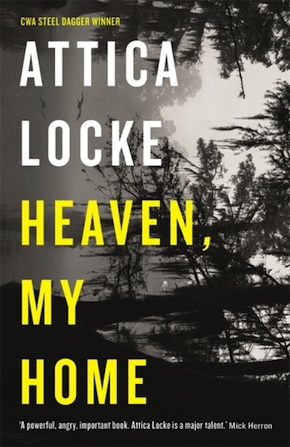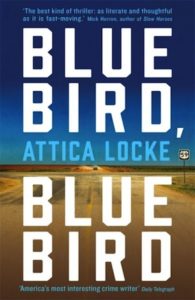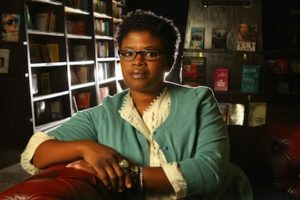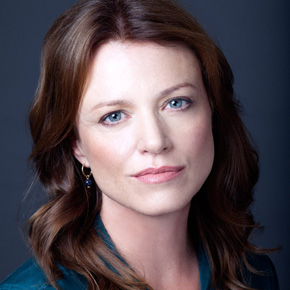America, are you listening?
by Karin Salvalaggio
“Attica Locke has both mastered the thriller and exceeded it.” Ann Patchett
Heaven, My Home is Attica Locke’s follow-up to her award-winning novel Bluebird, Bluebird. I’m pleased to report that the second instalment in the Highway 59 series is just as compelling as the first. Texas Ranger Darren Mathews is a fascinating character who is constantly having to balance his often conflicting realties. He is a black man working in law enforcement in a red state battling a whole host of external factors such as the largely unchecked growth of white supremacist groups and a blackmailing, no-good mother who holds his career and quite possibly his freedom in her greedy hands.
If we’re lucky, we can find a wealth of stories in the places we grew up. East Texas is Attica Locke’s ancestral home. Generations of her family have lived, worked and raised their children there. Her family stayed when so many other black people left. They owned land. They were settled. Locke’s territory was shaped over a lifetime of breathing the air, walking the land, and negotiating the unspoken complexities of the communities she came from. Only someone naturally attuned to the extended history of race relations in East Texas could pull off writing a book as multilayered as Heaven, My Home.
Locke is telling stories we all need to hear. In 1995 the Oklahoma bombing brought domestic terrorism to the nation’s attention, but in the wake of 9/11 the FBI’s funding and focus was largely redirected. The enemy, it was decided, was Islam. Over the ensuing years, the number of home-grown hate groups grew largely unchecked, ballooning to 1,018 after Obama’s election. The number of groups dropped 25% to 784 in 2014 but then rose to an all-time high when Trump was elected. Trump has, as former US Representative Mark Sanford said, “unearthed some demons.” The number of White Supremist groups has surged under his presidency, growing by more than 50% according to the Southern Poverty Law Center.
While her novels are rich with social commentary, they also provide a much-needed glimpse into the lives and mindsets of black Americans. Such insights can open people’s minds and hearts, but we have to make sure people are listening, that America is listening. I, for one, approve of her message.
I’ve always liked the idea of writing about outsiders. Then it occurred to me that I could write a cop who was an outsider, even – or especially – while wearing his badge.”
KS: In Heaven, My Home, Darren Mathews is sent into the heart of a community of white supremacists when 9-year-old Levi King goes missing. It is made clear from the outset that they are not pleased to have a black man in their midst. Racial abuse is rife and the threat of violence all too real. Yet Darren is constantly having to be the bigger man – twice as good and twice as smart, and even then it’s doubtful he’ll be respected by many of the people he’s duty-bound to protect. Could you tell me what inspired Darren’s character?
AL: I came up with the idea of the series first – I wanted to do a series of crime novels set along Highway 59 in East Texas, where my ancestors are from. But one of the things that makes a book series successful is its main character. So I tried to think of who my main character would be: a lawyer, a private investigator? I needed someone who could travel the state while doing his or her work. And then it became obvious: Texas Ranger. I then had to get over my own reservations about writing a cop as a main character. I’ve always liked the idea of writing about outsiders. Then it occurred to me that I could write a cop who was an outsider, even – or especially – while wearing his badge. I found a way for Darren’s ambivalence about being a black cop to serve as a stand-in for my own ambivalence about being a black American. Do the rules really apply to me? Or work against me?
There are some interesting parallels between Darren Mathews and Levi King. Fatherless, they might as well be motherless too, given the women who should be raising them seem keener on abusing drugs and alcohol than looking after their sons. Darren was fortunate to have been taken in by his uncles at a young age, but Levi isn’t so lucky. He’s growing up in a community of hateful white supremacists and will no doubt become one himself, if he survives. You must have seen examples of such situations first-hand when researching Heaven, My Home. Did you come up with any ideas of how we might stem the tide of hate going forward?
Not really. The only thing I can think of that could make serious change is for white folks who stay quiet and don’t challenge white supremacists, including the one in the White House, to see the ways in which they are complicit in the violence and hate that’s happening in America right now. To stop with the childish question about whether or not you personally think you’re racist and look at the irrelevance inherent in the question. It doesn’t matter if you think you’re not racist. By voting for Trump or in any other way normalising his white supremacist point of view, your impact on the world is racist. No matter if you have black and brown friends, co-workers, or family members.
The writing is an attempt to further understand my ambivalence about where I’m from; my deep love for the state of Texas (and America for that matter), even while the state and the nation continue to break my heart.”
I once described my novels about the rise of crime and drug abuse in small town America as a love letter to a lost, rural idyll. How would you describe your novels? Has writing them helped you make sense of your relationship with East Texas, and perhaps with the United States as a whole, in the time of Black Lives Matter, Trump’s election, and the unchecked rise of white supremacy?
I have called my books a love letter to black Texans. The writing is an attempt to understand the spirit of the people I come from, to further understand my ambivalence about where I’m from; my deep love for the state of Texas (and America for that matter), even while the state and the nation continue to break my heart. With this book in particular, I am working through my own struggle with forgiveness. I have been so wounded and soul-shattered by my country electing a white supremacist, and so fucking angry. I don’t know how to get past it. Part of the book was me struggling with that notion: will I ever get over this feeling of betrayal?

“America’s most interesting crime writer.” Daily Telegraph
The storylines in the Highway 59 series could have been taken from today’s headlines about the mass shootings in Charlottesville, El Paso, Gilroy and Pittsburgh, to name but a few. In Bluebird, Bluebird there’s an enlightening exchange between Randie and Darren regarding the Aryan Brotherhood of Texas. “Are we talking about the Klan?” she asks. “Worse,” he replies. “It’s the Klan with money and semi-automatic weapons.” The implication being that the Klan is quaint in comparison to white supremist groups. I’m sure you were aware of the Klan’s activities while growing up in Texas and that your family and neighbours may have had encounters with them. Did you have any idea how bad things were going to get?
My entire existence on this planet has been post-Civil Rights Movement in America. Prior to Trump, everything I’d ever witnessed in my life said that the country was on a march toward Dr King’s dream, that the arc of the moral universe did indeed bend toward justice, and then I awoke into a nightmare on a November morning in 2016. I knew if he was elected it would be exactly as bad as it is right now. I just truly didn’t believe that he would be elected. And the fact of it has so disrupted my naturally optimistic disposition and my experiential reading of American history as a nation on a slow, difficult, but ultimately upward march toward equality that I have been nearly vibrating with despondency and rage for two years.
In a 2017 Guardian interview you said that one of the pleasures of being a writer on Empire was the “the lack of a ‘white gaze’”, which must have been very freeing. You went on to say that you returned to writing novels because in writing the show, you felt too removed from your “actual voice”. Are you writing the Highway 59 series with the same attitude that you approached Empire?
In a sense, yes, in that I am not censoring myself. But I think I would be lying if I said I wasn’t thinking of the white gaze or white readers when I write. I think about white readers; I think about black readers; I think about Latino readers; I think about Native American readers. I consider the book from different points of view while I’m writing. It just doesn’t change what I’m writing.
Black representation in policing alone will not get us past the kind of police brutality we see in America. Internalised racism is real. And a lot of policing policy is set up to put black, brown and poor people under greater scrutiny.”
Before you wrote for Empire, you were hired to write political thrillers and character-led dramas, but none of the screenplays ended up in production. Then after Bluebird, Bluebird was published, TV rights for the planned Highway 59 trilogy were snapped up by FX – with you slated as writer. Any updates on that?
Unfortunately, there won’t be a Darren Mathews show on FX. Hard as we tried, the network and I both realised we couldn’t come up with a way to do the series that made of us both happy. Which happens sometimes. I’m grateful they tried with me.
Darren was raised by his uncles Clayton and William. Clayton is a lawyer who believes black people should be afraid of the law whereas William, now deceased, believed that the law is what will save them. After studying law at Princeton, Darren follows William’s footsteps and becomes a Texas Ranger. It’s clear to the reader that Darren sees himself as someone who will put black lives first. I’ve read that in the past you’ve said that you weren’t interested in writing about cops. What changed your mind? Could you talk a little about your views on the importance of black representation in policing?
Let me start by saying I don’t know that black representation in policing alone will get us past the kind of police brutality we see in America. Internalised racism is real. And a lot of policing policy is set up to put black, brown and poor people under greater law enforcement scrutiny. White cops commit most, if not all, of the police killings, but cops of all races harass black and brown folks.
Reading a book called Ghettoside by Jill Leovy broadened my thinking about what it would be like to write a black cop. The non-fiction book partly follows a black police officer in South Los Angeles, who chooses to live where he polices (unlike a lot of LA cops who clock out and drive as much as an hour to their suburban homes outside of the city every night). Inherent in this black cop’s decision was the idea that the flipside of “over-policing black life” is the historic under-policing and under-prosecuting of crimes against black life. The book predated the phrase ‘Black Lives Matter’, but this police officer was suggesting that this sentiment had a place in police precincts, that one aspect of Black Lives Matter is arresting and prosecuting people who commit violence against black life. In that book, I found the seeds of Darren Mathews.
Your novels are rich with musical references. I’ve enjoyed listening to the Spotify playlist for Bluebird, Bluebird and am hopeful one will be soon posted for Heaven, My Home. There’s a particular line from a Lightnin’ Hopkins song you chose to highlight – ‘Yeah, I’m black and I’m evil, but this black man did not make hisself.’ Could you comment on this particular line and how it may or may not apply to your characters, and on the role music plays in your novels as a whole?
This series will always be steeped in the blues. East Texas blues. Lightin’ Hopkins is my muse, has been for years, and so I am enjoying weaving so much of his voice into these books. It’s music deeply rooted in the part of the country I come from, and with Lightnin’ there are always moments of defiance in his music.
As for the above quote, it has many layers of meaning. Whatever way white folks choose to see us, don’t forget we’re God’s children same as you. But, also if – like Darren in this book – we act out sometimes in response to racism, well, that shit is on white folks too.
Lastly, I’m interested in how you want to be seen as a writer. Your work is rich in social commentary, much of it politically charged. In interviews you’re very vocal about your support of groups such as Black Lives Matter. Clearly these issues are very important to you personally, but as a black writer, do you feel pressured into including such topics in your work?
No pressure. It comes naturally.
 Attica Locke is the author of Bluebird, Bluebird which won the CWA Steel Dagger and an Edgar Award; Pleasantville, which won the 2016 Harper Lee Prize for Legal Fiction and was longlisted for the Baileys Women’s Prize for Fiction; Black Water Rising, which was nominated for an Edgar Award and shortlisted for the Orange Prize; and The Cutting Season, a national bestseller and winner of the Ernest Gaines Award for Literary Excellence. She worked on the adaptation of Celeste Ng’s Little Fires Everywhere and Ava DuVernay’s Netflix series about the Central Park Five, When They See Us. A native of Houston, Texas, Attica lives in Los Angeles, California, with her husband and daughter. Heaven, My Home is published in hardback and eBook by Serpent’s Tail.
Attica Locke is the author of Bluebird, Bluebird which won the CWA Steel Dagger and an Edgar Award; Pleasantville, which won the 2016 Harper Lee Prize for Legal Fiction and was longlisted for the Baileys Women’s Prize for Fiction; Black Water Rising, which was nominated for an Edgar Award and shortlisted for the Orange Prize; and The Cutting Season, a national bestseller and winner of the Ernest Gaines Award for Literary Excellence. She worked on the adaptation of Celeste Ng’s Little Fires Everywhere and Ava DuVernay’s Netflix series about the Central Park Five, When They See Us. A native of Houston, Texas, Attica lives in Los Angeles, California, with her husband and daughter. Heaven, My Home is published in hardback and eBook by Serpent’s Tail.
Read more
atticalocke.com
@atticalocke
Author portrait © Mel Melcon/Los Angeles Times
 Karin Salvalaggio is the author of the Macy Greeley crime novels Bone Dust White, Burnt River, Walleye Junction and Silent Rain and a contributing editor at Bookanista. Her fiction to date is set in towns that border the Montana wilderness, a uniquely spectacular landscape she fell in love with as a child. Her proudly independent characters inhabit stories about the American dream gone wrong. She is currently working on the final edits of a psychological thriller set closer to home in West London, where she has lived since 1994. The characters may be hemmed in by glass and steel, but the stories they tell are just as compelling.
Karin Salvalaggio is the author of the Macy Greeley crime novels Bone Dust White, Burnt River, Walleye Junction and Silent Rain and a contributing editor at Bookanista. Her fiction to date is set in towns that border the Montana wilderness, a uniquely spectacular landscape she fell in love with as a child. Her proudly independent characters inhabit stories about the American dream gone wrong. She is currently working on the final edits of a psychological thriller set closer to home in West London, where she has lived since 1994. The characters may be hemmed in by glass and steel, but the stories they tell are just as compelling.
@KarinSalvala

